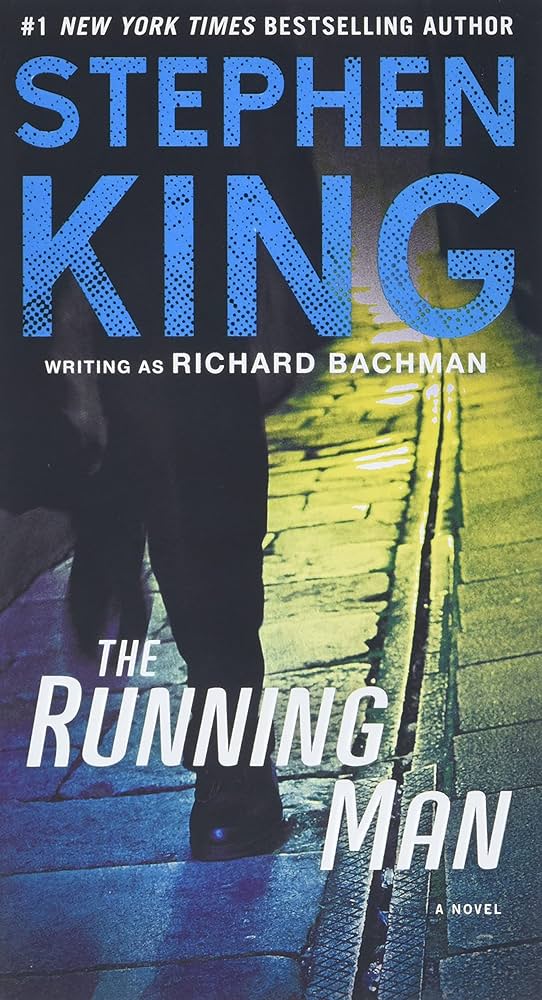Introduction: A Prophetic Descent into Media Madness
When Stephen King first unleashed The Running Man under his Richard Bachman pseudonym in 1982, few could have predicted how chillingly prescient this dystopian thriller would become. Set in a fictional 2025 America where reality television has evolved into state-sanctioned manhunts and economic disparity has reached feudal extremes, King’s novel presents a world that feels increasingly familiar with each passing year.
Unlike King’s supernatural horror works, The Running Man derives its terror from entirely human cruelty – a media-industrial complex that commodifies human suffering, a government that weaponizes entertainment, and a populace too distracted by spectacle to notice their eroding freedoms. At its core, the novel follows Ben Richards, a desperate father who volunteers for a deadly game show to secure medicine for his dying daughter, only to become an unwilling revolutionary.
This definitive review will examine:
- The novel’s intricate dystopian world-building
- Ben Richards’ transformation from victim to symbol
- King’s startling predictions about media culture
- The stark differences between novel and film adaptation
- The work’s growing relevance in our surveillance age
- Literary analysis of Bachman’s distinct narrative voice
Content Advisory
This novel contains graphic depictions of: State-sanctioned violence, extreme poverty, medical desperation, police brutality, and psychological manipulation. Recommended for mature readers.
The Game That Isn’t a Game
In the year 2025, America has become a stratified nightmare. Ben Richards, an unemployed factory worker with a desperately ill daughter, sees only one way out: volunteer for the Games Network’s most dangerous show, The Running Man. The rules are deceptively simple:
- Survive as a fugitive for 30 days
- Earn $100 per hour evading capture
- Win $1 billion if you survive the full month
- But everyone dies at the end – that’s the show’s guarantee
What begins as a desperate bid for money transforms into something far more dangerous when Richards starts using the show’s mandatory video diaries to expose government lies about pollution, poverty, and oppression. The hunted man becomes the hunter of truth, turning the game’s machinery against itself.
Literary Analysis: Bachman’s Bleak Vision
World-Building: America 2025
King’s dystopia features several innovative elements that set it apart from contemporaries like 1984 or Brave New World:
| Element | Description | Modern Parallel |
|---|---|---|
| The Free-Vee | Mandatory government-issued televisions | Always-on social media/streaming |
| Pollution Zones | Deliberate industrial poisoning of poor areas | Environmental racism cases |
| Games Network | State-run deadly reality TV | Extreme reality shows like Squid Game |
| Hunter Force | Celebrity police executioners | Militarized police forces |
Character Study: Ben Richards
Unlike typical dystopian heroes, Richards isn’t an intellectual or revolutionary. His transformation follows four distinct phases:
- The Broken Man: Introduced watching game shows in despair
- The Desperate Father: Willing to sell his life for medicine money
- The Cunning Survivor: Learning to manipulate the system’s rules
- The Unwilling Martyr: Recognizing his role as symbol outweighs his survival
Bachman vs. King: Narrative Voice
The Bachman pseudonym allowed King to explore a different style:
Richard Bachman’s Voice:
- Lean, economical prose
- Minimal supernatural elements
- Bleaker worldview
- Focus on blue-collar protagonists
- More political/social commentary
Contrast with King’s Usual Style:
- Rich descriptive passages
- Supernatural horror elements
- Redemptive arcs more common
- Broader character types
- More psychological focus
Novel vs. Film: Stark Contrasts
The 1987 Schwarzenegger adaptation fundamentally changed the story:
| Element | 1982 Novel | 1987 Film |
|---|---|---|
| Ben Richards | Desperate, sickly father | Wrongly convicted muscle-bound hero |
| Game Rules | 30-day survival against entire society | 24-hour chase with weapons |
| Ending | Suicidal attack on system | Heroic escape to paradise |
| Themes | Class warfare, media manipulation | Individual heroism, government conspiracy |
King has acknowledged that while the film is entertaining, it largely misses his novel’s central critique of media sensationalism and economic oppression.
Modern Relevance: King’s Prophetic Vision
Nearly four decades after publication, The Running Man reads less like fiction and more like cautionary tale:
- Reality TV Evolution: From Survivor to Squid Game, the escalation of televised suffering
- Social Media Hunt: Online mob mentality and cancel culture parallels
- Economic Divide: Growing wealth gap creating dystopian conditions
- Media Distraction: 24/7 entertainment masking societal collapse
- Environmental Racism: Deliberate pollution of poor communities
“In 2025, the poor were still poor. The middle class was still terrified of becoming poor. And the rich… well, the rich were doing just fine.”
Conclusion: Why The Running Man Matters Today
More than just a thriller, The Running Man stands as one of King’s most important social commentaries. Its vision of media as opiate, entertainment as control mechanism, and poverty as weapon grows more piercing as reality television evolves into social media spectacle and economic disparity reaches Gilded Age extremes.
While the Bachman books were originally conceived as an experiment, The Running Man has outgrown its pseudonymous origins to become essential reading for understanding our media-saturated age. Its greatest terror lies not in its fictional 2025, but in how many of its predictions have already come to pass.
Recommended for: Fans of dystopian fiction, media studies students, Stephen King completists, and readers interested in prophetic social commentary.
